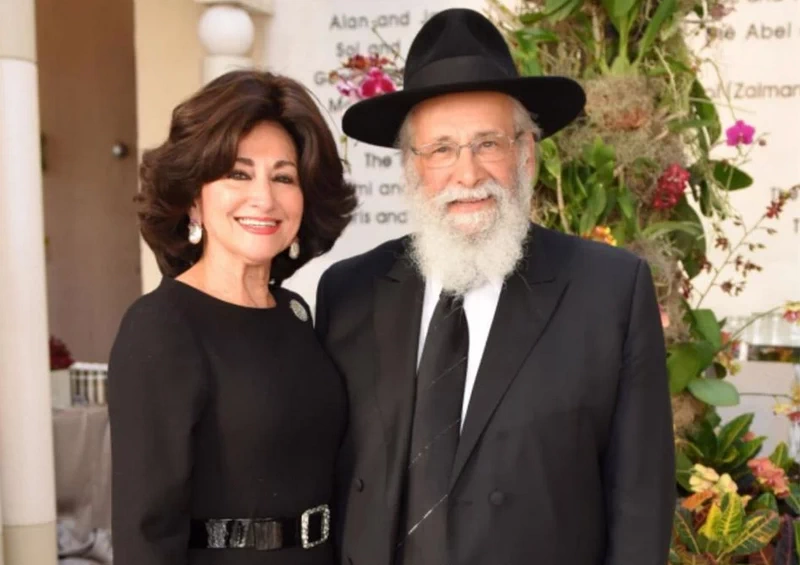
Rabbi Sholom Ber Lipskar, 78, Revolutionized Jewish Miami and Served Prisoners and Soldiers Worldwide
by Menachem Posner – chabad.org
It’s hard to quantify the impact of Rabbi Sholom B. Lipskar, who passed away on Shabbat, May 3 (5 Iyar), at the age of 78.
As the spiritual leader of the Shul of Bal Harbor for more than four decades, he was responsible for converting what was then a Miami neighborhood that was less than friendly to Jews into a flourishing center of Jewish life. And as founder of the Aleph Institute, he is responsible for the Jewish lives of thousands of men and women, both in the armed forces and also in the penal system.
Lipskar was born to Rabbi Eliyahu Akiva and Rochel Lipskar in the Soviet Union, just 20 days before his family’s miraculous escape from the Iron Curtain. Since he lacked any sort of documentation, he made the trip inside a suitcase.
After several years in DP camps, the family immigrated to Canada where the elder Rabbi Lipskar became an educator.
At the age of 15, Sholom Ber was sent to New York to study at the Central Lubavitcher Yeshivah. In 1969, following his marriage to Chani Minkowicz and a year of advanced study, he and his wife were ready to take their places as emissaries of the Rebbe, Rabbi Menachem M. Schneerson, of righteous memory. The Rebbe sent them to Miami, which then lacked even the most basic Jewish infrastructure.
Before they departed, the Rebbe told them, “I’m traveling with you! You should go with joy.”
Together, the couple took charge of the fledgling Chabad day school, which had been founded by Rabbi Avrohom Korf.
After a decade in education, the rabbi was ready to broaden his horizons. With the Rebbe’s encouragement, the couple founded a synagogue in the ritzy Bal Harbour and Surfside area, which was then so opposed to Jewish people living there that the rabbi did not show his face when his wife went house hunting.
From small beginnings, they built up a congregation that has become a guiding light for other Chabad centers to follow. In the early 1990s they built a beautiful center on Collins Avenue known as The Shul, which was then revolutionary in its size and beauty. In fact, it was the Rebbe himself who described it as a pilot project for the entire world—a place where visitors from across the globe would draw inspiration and bring it back home. Nearly 20 years later, the synagogue had so thoroughly outgrown its existing space that it expanded to the tune of $20 million.
But the rabbi was far from a mere planner and builder of buildings. He was an architect of souls, who has directly brought tens of thousands of individuals and families closer to Judaism. The sheer range of his mentees is astonishing, ranging from wealthy Floridians to down-and-out street people. To him it made no difference. He saw the soul and did what he could to make each one shine that much brighter through exposure to Torah and unfiltered love.
Perhaps no accomplishment defined Rabbi Lipskar more than The Aleph Institute. Founded at the Rebbe’s urging after a powerful farbrengen call to assist incarcerated Jews, Rabbi Lipskar made it his life’s mission to ensure that no Jew was ever forgotten, no matter how distant. He visited prisons, taught Torah behind bars, and offered dignity and support to countless individuals.
Lipskar recalled the time in 1985 when he got permission from the Bureau of Prisons to take a group of 20 screened prisoners from 12 federal facilities to take part in a mentorship program run outside of prison by Aleph. They all traveled to New York, and on Shabbat, Lipskar arranged for the men to join the Rebbe’s farbrengen at his synagogue at 770 Eastern Parkway in Brooklyn. It being a packed crowd, Lipskar pulled strings to have a table saved for his group so that they could be guaranteed seats together.
At 1:30, just before the farbrengen was set to start, the Rebbe sent a message to Lipskar via a secretary: The group should not sit together. People would see the prisoners come in together, recognize they did not look like Chassidim and ask them where they came from. This might cause the prisoners embarrassment; instead, the Rebbe said, they should be spread about the room.
“There was almost never a time when I passed by the Rebbe for dollars that he didn’t mention Aleph,” Lipskar told Chabad.org in 2019, noting that he would send the Rebbe regular reports on the organization’s activities. “He would give me a dollar especially for Aleph and say, in Yiddish, ‘For the entire Aleph,’ or ‘Aleph [the first letter in the Hebrew alphabet] guides all the letters that follow,’ or something of that nature.”
In time, the organization was expanded to serve people in the armed forces, providing them with kosher food, resources, support and care.
In addition to his wife Chani, he is survived by his children, Devorah Leah Andrusier and Zalman Lipskar, many grandchildren, and his siblings Rabbi Mendel Lipskar, director of Chabad-Lubavitch of South Africa, Batsheva Schochet and Yossi Lipskar.
A fuller tribute for Rabbi Lipskar is being prepared.













